| Elvis Presley |
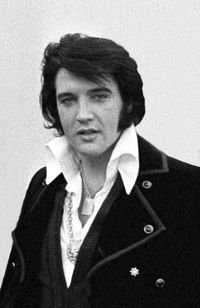
Elvis Presley circa 1970.
|
| Musical artist |
| Birth name |
Elvis Aron Presley |
| Born |
January 8, 1935 |
| Origin |
Tupelo, Mississippi, USA |
| Died |
August 16, 1977; Memphis, Tennessee, USA |
| Genre(s) |
rock/pop |
| Occupation(s) |
Singer, record producer, soldier in the United States Army and actor |
| Instrument(s) |
Singing, guitar, piano |
| Years active |
1954 - 1977 |
| Label(s) |
Sun, RCA |
Elvis Aron Presley (January 8, 1935 - August 16, 1977), known simply as Elvis, also known as "The King of Rock 'n' Roll" or
just "The King" was an American singer, music producer and actor. Elvis was a giant in the modern entertainment industry and of American
culture. His image is iconic. Graceland, the estate in Memphis, Tennessee where he lived for 20 years, and died, was designated a National Historic
Landmark on March 27, 2006.
Long after his death at age 42, Presley remains a popular and enigmatic star. Throughout his musical career of over two decades, Presley set records
for concert attendance, television ratings and record sales. As of 2006, more than a quarter century after his death, Presley remains the best-selling
solo artist in popular music history, according to the RIAA. He had 104 singles in the US top 40, almost twice as many as the runner-up, with 17 of
these reaching number one according to Billboard's 2005 revised methodology. Presley's continuing worldwide popularity has resulted in his global sales
reaching an estimated one billion records to date.
An American phenomenon
According to Rolling Stone magazine, "it was Elvis who made rock 'n' roll the international language of pop". A PBS documentary once
described Presley as "an American music giant of the 20th century who singlehandedly changed the course of music and culture in the mid-1950s."
His recordings, dance moves, attitude and clothing came to be seen as embodiments of rock and roll. His music was heavily influenced by blacks who
could not gain national attention because of prejudice. Presley sang both hard driving rockabilly and rock and roll dance songs and ballads, laying
a commercial foundation upon which other rock and roll musicians would build. African-American performers like Little Richard and Chuck Berry came
to national prominence after Presley's acceptance among mass audiences of white teenagers, even though his music was strongly influenced by some of
those same African-American musicians. Singers like Jerry Lee Lewis, the Everly Brothers, Buddy Holly, Roy Orbison and others immediately followed
in his wake, leading John Lennon to later observe, "Before Elvis, there was nothing."
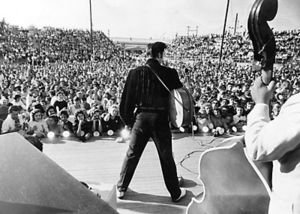
Elvis Presley at the Mississippi-Alabama State Fair, 1956
Teenagers came to Presley's concerts in unprecedented numbers. When he performed at the Mississippi-Alabama Fair in 1956, 100 National Guardsmen
surrounded the stage to control crowds of excited fans. When municipal politicians began denying permits for Presley appearances, teens piled into
cars and traveled elsewhere to see him perform. In an industry already shifting to all-music formats in reaction to television, profit-conscious
radio station owners learned hard lessons when sponsors bought advertising time on new rock and roll stations, some of which reached enormous markets
at night with clear channel signals from AM broadcasts.
During the post-WWII economic boom of the 1950s, many parents were able to give their teenaged children much higher weekly allowances, signalling a
shift in the buying power and purchasing habits of American teens. During the 1940s bobby soxers had idolized Frank Sinatra, but the buyers of his
records were mostly between the ages of eighteen and twenty-two. Presley triggered a juggernaut of demand for his records by near-teens and early
teens aged ten and up.
Along with Presley's "ducktail" haircut, the demand for black slacks and loose, open-necked shirts resulted in new lines of clothing for teenaged boys.
In 1956 America, birthday and Christmas gifts were often music or even Presley-related. A girl might get a pink portable 45 rpm record player for her
bedroom. Meanwhile American teenagers began buying newly available portable transistor radios and listened to rock 'n' roll on them (helping to propel
that fledgling industry from an estimated 100,000 units sold in 1955 to 5,000,000 units by the end of 1958). Teens were asserting more independence and
Elvis Presley became a national symbol of their parents' consternation.
Presley's impact on the American youth consumer market was noted on the front page of The Wall Street Journal on December 31, 1956 when business
journalist Louis M. Kohlmeier wrote, "Elvis Presley today is a business," and reported on the singer's record and merchandise sales. Half a century
later, historian Ian Brailsford (University of Auckland, New Zealand) commented, "The phenomenal success of Elvis Presley in 1956 convinced many doubters
of the financial opportunities existing in the youth market.
Birth and ancestry
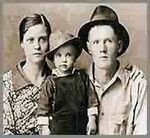
Young Elvis with his Mother Gladys and Father Vernon.
Elvis Aron Presley was born on January 8, 1935 at around 4:13 a.m. in a two-room shotgun house in East Tupelo, Mississippi to Vernon Elvis Presley and
Gladys Love Smith. His twin brother, Jesse Garon Presley, was stillborn, thus leaving him to grow up as an only child. The surname Presley was
Anglicized from the German Pressler during the Civil War. His ancestor Johann Valentin Pressler emigrated to North America in. Presley was mostly of
Scottish and English descent, although his family tree also includes Native American, German, and South African roots. His maternal line traces to a
Jewish ancestor; because of this, Presley had a star of David placed on his mother's tombstone.
Youth
Elvis's parents were very protective. He "grew up a loved and precious child. He was, everyone agreed, unusually close to his mother. His mother
Gladys "worshiped him," said a neighbor, "from the day he was born." Elvis himself said, "My mama never let me out of her sight. I couldn't go down
to the creek with the other kids. In his teens, Elvis was still a very shy person, a "kid who had spent scarcely a night away from home in his nineteen
years." He was teased by his fellow classmates who threw "things at him - rotten fruit and stuff - because he was different, because he was quiet and
he stuttered and he was a mama's boy. Psychologists believe that the disappearance of his father "Vernon from Elvis' life when the King was three
(Vernon was jailed for passing bad cheques) had a profound effect upon Elvis' emotional development" at an age when "a child naturally goes through a
separation anxiety from its mother, which fathers can often help with. Elvis only had Gladys. They slept in the same bed up until Elvis was a young
teen. Guitarist Scotty Moore still attested that the singer was a "typical coddled son" and "very shy": "His mama would corner me and say, 'Take care
of my boy. Make sure he eats. Make sure he -' You know, whatever. Typical mother stuff." But Elvis "didn't seem to mind; there was nothing phony about
it, he truly loved his mother. Gladys was so proud of her boy, that she "would get up early in the morning to run off the fans so Elvis could sleep".
She was frightened of Elvis even going out of the house: "She knew her boy, and she knew he could take care of himself, but what if some crazy man came
after him with a gun? she said ..., tears streaming down her face.
The Sun recordings
On July 18, 1953 Presley paid $8.25 to record the first of two double-sided demos acetates at Sun Studios, "My Happiness" and "That's When Your
Heartaches Begin" which were popular ballads at the time. According to the official Presley website, Presley reportedly gave it to his mother as a
much-belated birthday present. Presley returned to Sun Studios (706 Union Avenue, Memphis, Tennessee) on January 4, 1954. He again paid $8.25 to record
a second demo, "I'll Never Stand in Your Way" and "It Wouldn't Be the Same Without You" (master 0812).
Another receipt for $8.25 dated June 9, 1954 for master 0914 has been found and perhaps that could be the legendary "Casual Love Affair", the song that
everybody presumed was recorded on January 4, 1954. Sun Records founder Sam Phillips and assistant Marion Keisker heard the discs and called Presley on
June 26, 1954 to fill in for a missing ballad singer. Although that session was not productive, Sam Phillips put Presley together with local musicians
Scotty Moore and Bill Black to see what might develop. During a rehearsal break on July 5, 1954, Presley began singing a blues song written by Arthur
Crudup called "That's All Right". Phillips liked the resulting record; on July 19, 1954 he released it as a 78 rpm single backed with Presley's hopped-
up version of Bill Monroe's bluegrass song "Blue Moon of Kentucky." Memphis radio station WHBQ began airing it two days later, the record became a local
hit and Presley began a regular touring schedule which expanded his fame beyond Tennessee. Country music star Hank Snow arranged to have Presley perform
at Nashville's Grand Ole Opry and his performance was well received. Nonetheless, one of the show's executives was not impressed and hinted that
Presley should give up his music. However, since that time many singers (Garth Brooks among them) have commented that one of the greatest thrills of
playing the Opry is that they played on the same stage as Presley.
Presley's second single, "Good Rockin' Tonight", with "I Don't Care if the Sun Don't Shine" on the B-side, was released on September 25, 1954.
He continued to tour the South. On October 16, 1954, he made his first appearance on Louisiana Hayride, a radio broadcast of live country music
in Shreveport, Louisiana, and was a hit with the large audience. Following this, Presley was signed to a one-year contract for a weekly performance,
during which time he was introduced to Colonel Tom Parker. This helped sales of his records as his releases began to reach the top of the country charts.
Early TV appearances and movie contracts
On August 15, 1955 Elvis Presley was signed by "Hank Snow Attractions", a management company jointly owned by singer Hank Snow and Colonel Tom Parker.
Shortly thereafter, Colonel Parker took full control and, recognizing the limitations of Sun Studios, negotiated a deal with RCA Victor Records on
November 21, 1955, then immediately established two New York City recording companies for Presley's music. Understanding the commercial value for any
composer having their song recorded by Presley, Parker was able to demand they share their royalties with the singer. A master promoter who wasted no
time in furthering Presley's image, Parker licensed everything from guitars to cookware.
Parker's first major coup was to market Presley on television. First, he had him booked in six of the Dorsey Shows (CBS); Elvis appeared on the show on
January 28, 1956, then again on February 4, 11 & 18, 1956, with two more appearances on March 17 & 24, 1956. In March, he was able to obtain a
lucrative deal with Milton Berle (NBC), for two appearances. The first was on April 3, 1956. It was Elvis' performance of "Hound Dog" on the June 5,
1956, episode of the Milton Berle Show that sparked a storm of controversy over his "gyrations" while singing. The controversy lasted through the rest
of the 50's. However, the show did draw such huge ratings that Steve Allen (ABC) booked him for one appearance, which took place early on July 1, 1956.
That night, Allen had for the first time beaten the Ed Sullivan Show in the Sunday night ratings, prompting Sullivan (CBS) to book Presley for three
appearances, September 29, 1956; October 28, 1956 & January 6, 1957, for an unprecedented fee of $50,000. On September 9, 1956, at his first of
three appearances on the Sullivan show, Presley drew an estimated 82.5% percent of the television audience, calculated at between 55-60 million viewers.
Simultaneously, and after being approached by the Hollywood Studios, Parker eventually negotiated a multi-picture seven-year contract that shifted
Presley's focus from music to films. Under the terms of his contract, Presley earned a fee for performing plus a percentage of the profits on the films,
most of which were huge moneymakers (see "Movies" section below). With money seemingly at the forefront of all decisions made by the Colonel, his
success led to his management contract with Presley being renegotiated to an even 50/50 split.
Over the years, much has been written about Colonel Parker, most of it critical. Marty Lacker, a lifelong friend and a member of the Memphis Mafia,
says he thought of Parker as a "hustler and scam artist" who abused Presley's reliance on him. Nonetheless, Lacker acknowledged that Parker was a
master promoter. Priscilla Presley has said she didn't know who else there was at the time in 1955 who could have seized the moment and done the job
of marketing Presley. A detailed biography of Parker was written by Alanna Nash and published in 2003.
Military service
On December 20, 1957, at the peak of his career, Presley received his draft notice for two-year service with the United States Army. On March 24, 1958,
he was inducted into the Army at the Memphis Draft Board. In spite of thousands upon thousands of letters sent to the Army expressing his fans' wishes
that he be spared, or that he be given special treatment, Presley received none of it and was widely praised for neither avoiding the draft nor serving
part time in domestic positions such as the Special Services. The media speculated on whether two years out of the limelight would damage his career.
Presley sailed to Europe on the USS General George M. Randall (AP-115) and served in Germany, attaining the rank of sergeant. During his service,
he met many people in the US Army bases he was trained at, and abroad, both in Germany and in France, where he travelled on leave on at least three
different occasions. Years later, many still recall with much admiration and affection their time together with Presley, no matter how casual or short-
lived the encounter may have been. Among them were his wife-to-be, the then 14-year-old Priscilla Beaulieu, noted International Herald Tribune
correspondent and humorist Art Buchwald, future US Secretary of State Colin Powell (then a lieutenant with the Third Army Division in Germany), and
Walter Alden, the father of Presley's last girlfriend, Ginger Alden, then a sergeant and in charge of Army public relations in Germany. In 1992, a book
was published about Presley's time in Germany titled Soldier Boy Elvis, written by his Sergeant Ira Jones.
Presley's impact on people, even during his two-year stint in the Army was remarkable, even reaching beyond his career as an entertainer. When he first
entered the Army, only 2% of the American population had been vaccinated against polio. Presley got his shot on TV, an event carried by all three major
networks. By the time of his discharge, an estimated 85% of the population had been vaccinated.
Presley returned to the United States on March 2, 1960 and was honorably discharged on March 5th. Because of all the publicity that surrounded his draft
and service in the Army, he is often referred to as the most celebrated G.I. in history.
Comeback
Many observers (including John Lennon) later claimed that following Presley's return from military service the quality of his recorded output dropped,
although others thought he was still capable of creating records equal to his best (and did so on the infrequent occasions where he was presented with
"decent" material at his movie recording sessions). Presley himself became deeply dissatisfied with the direction his career would take over the ensuing
seven years, notably the film contract with a demanding schedule that eliminated creative recording and giving public concerts. On April 8, 1960 the
album Elvis is Back! was released to mixed reviews by critics and fans. With this drop-off, and in the face of the social upheaval of the 1960s
and the British Invasion spearheaded by the Beatles, Presley's star faded slightly before a triumphant televised performance later dubbed the '68
Comeback Special. Aired on the NBC network on December 3, 1968, this saw him return to his rock and roll roots. His 1969 return to live performances,
first in Las Vegas and then across the country, was noted for the constant stream of sold-out shows, with many setting attendance records in the venues
where he performed.
1969 onward
After seven years off the top of the charts, Presley's song "Suspicious Minds" hit number one on the Billboard music charts on November 1, 1969.
He also reached number one on charts elsewhere. For example, "In the Ghetto" did so in West Germany in 1969, as did "The Wonder of You" in the UK in
1970. The "Aloha from Hawaii" concert in January 1973 was the first of its kind to be broadcast worldwide via satellite and was seen by at least one
billion viewers worldwide. The soundtrack album was another number-one disc.
Presley recorded a number of country hits in his final years. Way Down was racing up the American Country Music chart shortly before Presley's
death in 1977, and reached number one the week he died. It also topped the UK pop charts at the same time. Between 1969 and 1977 he gave over 1,000
sold-out performances in Las Vegas and on tour. He was the first artist to have four shows in a row sold to capacity at New York's Madison Square
Garden.
During the mid-1970s Presley became increasingly isolated, battling an addiction to prescription drugs and its resulting toll on his appearance, health
and performances. He made his last live concert appearance in Indianapolis at the Market Square Arena on June 26, 1977.
Movies
In late 1955, Presley made his earliest known film appearance in a documentary titled The Pied Piper of Cleveland, a look at the career of
disc jockey Bill Randle. The film, (which reportedly included performance footage of Elvis as well as Bill Haley and His Comets and other acts), was
shown in its entirety only once (in Cleveland) and was never released commercially. The film is currently considered "misplaced" and some Presley
researchers maintain it never existed, although there is ample evidence to suggest it did.
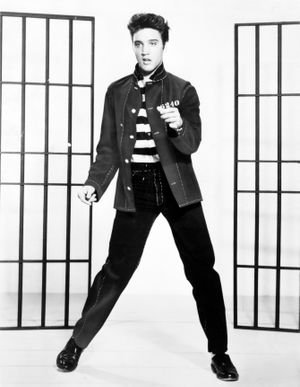
Elvis in 1957
Beginning with Love Me Tender (opened on November 15, 1956), Presley starred in 31 movies, having signed to multiple long-term contracts on
the advice of his manager. These were usually musicals based around Presley performances, and marked the beginning of his transition from rebellious
rock and roller to all-round family entertainer. Presley was praised by all his directors, including the highly respected Michael Curtiz, as
unfailingly polite and extremely hardworking.
Perhaps the biggest letdown of Presley's film career was when Colonel Parker made him give up the lead role in the film version of West Side Story.
Elvis was approached at first by the producers, being their favorite choice among several leading men. He originally wanted to play the role, but
Parker insisted he pull out to star in the musicals he was accustomed to. From 1960 to 1961, the total box office earnings of his movies were $100
million, but he was upset upon learning that West Side Story was a huge hit and earned ten Academy Awards. Till the end of his life, Presley
never forgave the Colonel for his loss, and he never watched his films, which were, according to him, travellogue movies with no plot but exotic
locales.
Other big disappointments included when the Colonel persuaded him not to audition for a main role in The Godfather, Cat On a Hot Tin Roof, The Defiant
Ones, Midnight Cowboy, and A Star Is Born with Barbara Streisand. All these roles led to box office success, critical acclaim, and Academy Awards for
the actors that took his place. Elvis never really got over these chances, which would have boosted his acting career.
The movies Jailhouse Rock (1957), King Creole (1958), and Flaming Star (1960) are regarded among film critics as his best. Among
fans, Blue Hawaii (1961) and Viva Las Vegas (1964) are also highly praised.
Religious fervor, gospel music, and allegations of sinfulness
In 1948 the Presley family left Tupelo, moving 110 miles northwest to Memphis, Tennessee. Here too, the thirteen-year-old Elvis lived in the city's
poorer section of town and attended a Pentecostal church. At this time, he was very much influenced by the Memphis blues.
People who decades later would be considered part of the religious right spoke out vigorously against Presley, including Cardinal Spellman. In its
weekly periodical, the Roman Catholic Church added to the criticism in an article titled "Beware Elvis Presley."
In August, 1956 in Jacksonville, Florida a local Juvenile Court judge called Presley a "savage" and threatened to arrest him if he shook his body
while performing at Jacksonville's Florida Theatre, justifying the restrictions by saying his music was undermining the youth of America. Throughout
the performance Presley stood still as ordered but poked fun at the judge by wiggling a finger. Similar attempts to stop his "sinful gyrations"
continued for more than a year and included his often noted January 6, 1957 appearance on The Ed Sullivan Show (during which he performed the
spiritual number "Peace in the Valley") when he was seen only from the waist up.
His Hand in Mine (1960) was the title of Presley's first gospel album. He said his music came from gospel and told a reporter that he "knew
every gospel song there is. Despite his church's attitude, gospel music was a prominent part of Presley's repertoire throughout his life. From 1971
to his death in 1977 Presley employed the Stamps Quartet, a gospel group, for his backup vocals. He recorded several gospel albums, earning three
Grammy Awards for his gospel music. In his later years Presley's live stage performances almost always included a rendition of "How Great Thou Art,"
the 19th century gospel song made famous by George Beverly Shea. Twenty-four years after his death, the Gospel Music Association finally inducted him
into its Gospel Music Hall of Fame (2001).
Voice characteristics
Elvis Presley was a baritone whose voice had an extraordinary compass - the so-called register - and a very wide range of vocal color. It covered two
octaves and a third, from the baritone low-G to the tenor high B, with an upward extension in falsetto to at least a D flat. Presley's best octave was
in the middle, D-flat to D-flat. In ballads and country songs he was able to belt out full-voiced high Gs and As, showing a remarkable ability to
naturally assimilate styles, and eliciting a multiplicity of voices.
Presley's range, though impressive in its own right, did not in itself make his voice that remarkable, at least in terms of how it measured against
musical notation. What made it extraordinary, was where its center of gravity lay. By that measure, and according to Gregory Sandows, Music Professor
at Columbia University, Presley was at once a bass, a baritone and a tenor, most unusual among singers in either classical or popular music.
Relationships

June Juanico & Elvis.
Apart from Marilyn Monroe, no entertainer has ever had his life and intimate relationships examined in as much detail as has Elvis Presley. Even the
FBI had a file on him of more than 600 pages. He has been the subject of over 718 books (and counting), including two by his only wife, Priscilla
Beaulieu Presley (whom he married on May 1, 1967) and several others by former girlfriends including June Juanico. Since his death many claims to
relationships have been made by women who were no more than acquaintances or had short affairs which were exaggerated for personal gain.
Mama's boy
The first woman in Elvis's life was his mother Gladys. In a newspaper interview with The Memphis Press Scimitar, Elvis himself was open about
the relationship to his mother. "She was the number-one girl in his life, and he was dedicating his career to her." The writer called Elvis "a hillbilly
cat", poked fun at Elvis's closeness to his mama and insinuated Elvis was "talented but simple." Throughout her life, "the son would call her by pet
names", and they communicated by baby talk. When Elvis was sharing his mother's bed as a boy, "Gladys told him he was her little man. Not only was
Elvis Gladys's son, she also made it clear he was her mate. On another occasion, "Gladys grabbed Elvis and held him close. 'Jus' you 'member, nobody
loves you like I do. You always got me.' Translated to mean: You best not put any girl before your mama again. ... Gladys wanted to be everything to
Elvis and wanted more from him than what was right or healthy to expect. His father still openly talked about Elvis' close relationship to his mother
after his son had become famous. When his mother died, Elvis was "sobbing and crying hysterically", and eye-witnesses relate that he was "grieving
almost constantly" for days.
High school and early stardom
The early experiences that he was teased by his fellow classmates for being a mama's boy had a deep influence on his clumsy advances to girls. He
didn't have any friends as a teen. Beginning in his early teens, Presley embarked upon the "indefatigable pursuit of girls", but was totally rebuffed.
At school, anyone "wishing to provoke a little girl to tears of rage had only to chalk "Elvis loves -" and then the girl's name on the blackboard when
the teacher was out of the room." This may have contributed, at first, to his lifelong need for a beautiful woman to offset his feelings of inadequacy.
According to Guralnick, he loved playing with the girls and teasing them, but it "didn't go too far. ... In between shows at the auditorium he would
peek out from behind the curtain, then, when he spotted someone that he liked, swagger over to the concession stand, place his arm over her shoulder,
and drape his other arm around someone else, acting almost like he was drunk. However, from looking at the numerous pictures of Presley starting at the
age of 14, what is also quite evident is that the teenager who was usually dismissed, and rebuffed by girls his age, was not the extraordinarily
handsome young man he indeed became by age 20. Between 1954 and 1956, when his stardom began to rise, the impoverished son of welfare recipients went
from being shunned and even mocked by some of the popular girls from his junior and high school days, to being the subject of adulation and adoration
of some of the most beautiful girls in Memphis, then of young Hollywood starlets such as Natalie Wood and Connie Stevens. Shelley Winters claimed the
relationship between Presley and Natalie Wood developed into something more serious than what was generally reported in the media. However, according
to Wood biographer Gavin Lambert, Elvis' mother believed that Natalie was a schemer who hoped to "snare" Elvis only "for publicity purposes." When a
columnist wanted to know if the romance with Elvis was "serious," Natalie's cool answer was, "Not right now." "But who knows what will happen?" One of
her judgements of Elvis was, "He can sing but he can't do much else."
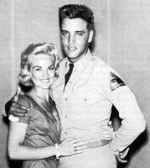
Anita Wood and Presley.
There were several significant relationships in Presley's life other than his one marriage to Priscilla Beaulieu. They included Dixie Locke, a high
school sweetheart who he met at his Assemblies of God Pentecostal church and was part of his life before and during his Sun Records time. Anita Wood,
another wholesome Christian girl whom Gladys Presley hoped he would eventually marry, was with Presley as he rose to superstardom, served in the US
military and returned home in 1960. Anita lived at Graceland for a time but moved out after confronting him over Priscilla Beaulieu, the "girl in
Germany." Following media reports of a girlfriend in Germany, Presley "had me [sc. Anita Wood] believing that she [sc. Beaulieu] was
just a friend and her daddy was in the Army with him, and there was nothing to it whatsoever." Presley used his charm to persuade Anita to move back
into Graceland, but she remained only a few months before leaving permanently. Presley immediately began a short-lived affair with Anne Helm, his
co-star from the film Follow That Dream. Helm came to Graceland for a short time but her quick exit allowed for the entrance of Beaulieu, who
moved to Memphis in 1962.
However, according to some authors, there were also other sides of Presley's relationships with women. Albert Goldman goes as far as to call him a
"pervert" dating fourteen-year-old girls. Elvis had a predilection for underaged girls, as "with teenage girls, he felt more secure he wouldn't be
pleasuring himself with a mother." Home movies were made with these girls. Goldman cites Presley's closest friends and relatives in order to support
his view that the star was an undisciplined, self-indulgent hillbilly with a sickly Oedipal relationship with his obese, smothering mother. Greenwood
even suggests that "Long-buried Oedipal desires scratched at the surface of his consciousness and threatened to come forth," when Elvis "put Priscilla
on a pedestal alongside the gilded image of his deceased mother." Indeed, there were accusations based on claims by the singer's stepmother, Dee
Presley, that Elvis may have had an incestuous relationship with his mother.
Priscilla Beaulieu Presley and other relationships

Priscilla Presley
Accounts differ on whether Presley had sex with Priscilla Beaulieu before they married. Priscilla recounted how Presley suffered from insomnia and
would stay up all night and sleep most of the day. She described him as a very passionate man who was not overtly sexual toward her and condemned
pre-marital sex as a sin. Suzanne Finstad says that Priscilla and Presley slept together on their second date and that she wasn't a virgin on her
wedding night.
Presley's ex-wife and several girlfriends confirmed that while demanding purity and loyalty from them, Presley had numerous affairs with other women
he had no plans of staying with. Whether he had sex with them is unclear. Some authors say that Presley's "list of one-night stands would fill volumes."
Alanna Nash in an article for Playboy alleges that "he (Elvis) would never put himself inside one of these girls." Priscilla Presley relates
that Elvis told her that he didn't make love to Anita Wood the whole four years he went with her. Model and actress Peggy Lipton, who had a fling with
Presley, says that the singer didn't feel like a man next to her and was "virtually impotent" with her. Suzanne Finstad also claims that Presley wasn't
overtly sexually active.
Priscilla Beaulieu wrote that his philandering made her "crazed with worry," particularly his highly-publicized relationship with Ann-Margret, which
he tried to hide from her. Shortly after he and Priscilla married and she got pregnant, Presley became involved with Nancy Sinatra. When questioned by
his wife, Presley denied any affair but then out of the blue, Nancy Sinatra, who barely knew Priscilla, called her and offered to organize her baby
shower. Shortly after this, Presley left his expecting wife in shock by asking for a trial separation. On 1 February 1968 (nine months to the day
after her wedding), Priscilla gave birth to their daughter Lisa Marie Presley, in Memphis, Tennessee.
Later years
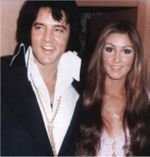
Elvis & Linda Thompson.
After five years of marriage Elvis and Priscilla separated on 23 February 1972. Presley blamed the pressures of his traveling six months of the year
on the road for the break-up. Twenty-four at the time, Priscilla took custody of Lisa, four. Following the separation, the thirty-seven-year-old Presley
immediately became involved with a twenty-one-year-old beauty queen, Linda Thompson, who may or may not have moved in. Presley dated a host of others
besides Thompson, notably his backup singer Kathy Westmorel and Cybill Shepherd, who spoke about her relationship with Presley while he was performing
in Las Vegas: "years later, I would read and find out that he had like two other women there at the same time." Thompson knew Presley had been cheating
on her but stayed with him anyway until he ended it in late 1976 when he began a relationship with 21 year-old Ginger Alden.

Ginger Alden.
Alden, unlike Thompson and Priscilla, did not move in with Presley when he asked her and he told her that he respected her for not doing so and had
great respect for her and her family. Presley proposed to Alden by giving her an 11 1/2 carat (2.3 g) diamond engagement ring made from his favorite
TCB ring on January 26, 1977 (they had plans for a Christmas wedding in 1977). Vernon Presley, Elvis's father, stated in an interview that his son
told him that he had "finally" found the love that he had been searching for all his life and that he wanted more children, a son, and wanted Alden
to be the mother. Vernon also stated that Elvis told him that Graceland had come "alive" again after meeting Alden, and that he could see Elvis as
that little boy from Tupelo again. However, Presley died before he could fulfill that lifelong search.
Death and burial
On August 16, 1977, at his Graceland mansion in Memphis, Tennessee, Presley was found lying on the floor of his bedroom's ensuite bathroom by his
fiancee, Ginger Alden, who had been asleep in his bed. He was taken to Baptist Memorial Hospital, where doctors pronounced him dead at 3:30 p.m.
He was 42 years old.
In her 1987 book Elvis and Kathy, friend and backup vocalist Kathy Westmoreland wrote "Everyone knew he was sick, that each public appearance
brought him to the point of exhaustion."
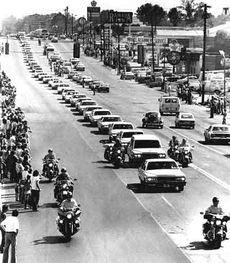
Elvis Presley funeral procession.
At a press conference following his death, one of the medical examiners declared that he had died of a heart attack. Heart disease was very prevalent
in his family. His mother, Gladys Presley, died of a heart attack brought on by acute hepatitis at age 46. Presley's father Vernon died of heart
failure in 1979.
Dr. Willis Madrey, who had examined Presley's liver in 1975, said, "I had understood he was having some gastrointestinal problems his doctors were
trying to evaluate." Most likely, he was referring to Presley's enlarged colon, which worsened over time and may have led to diverticulitis. It is
believed that possibly his gastrointestinal problems, combined with a weak heart, caused his death; however, since the autopsy records will not be
in the public domain until 2027, we do not know with certainty yet. It is a lasting theory, though never confirmed, that he died on the toilet,
defecating.
According to Peter Guralnick's book, Careless Love: The Unmaking of Elvis Presley (1999), "drug use was heavily implicated in this unanticipated
death of a middle-aged man with no known history of heart disease ... It was certainly possible that he had been taken while 'straining at stool,' and
no one ruled out the possibility of anaphylactic shock brought on by the codeine pills he had gotten from his dentist, to which he was known to have
had a mild allergy of long standing. ... There was little disagreement in fact between the two principal laboratory reports and analyses filed two
months later, with each stating a strong belief that the primary cause of death was polypharmacy, and the BioScience Laboratories report ... indicating
the detection of fourteen drugs in Elvis' system, ten in significant quantity."
In his book, Elvis: The Last 24 Hours, Albert Goldman even went as far as to suggest that Presley killed himself by overdosing on a stash of
drugs that he stockpiled. David Stanley, Presley's stepbrother, who was at Graceland the day Presley died, is said to have removed the needles and
drug packets near Presley's body before the paramedics arrived, suggesting that he did not want to see Presley's name tarred with the brush of suicide.
On the other hand, some of his closest family members, friends, band members, and background singers have long disputed stories concerning Presley's
alleged drug abuse and "self-destructive" lifestyle. At the same time, they have not denied that he did take prescription medications for bona fide
or suspected health problems. For instance, the late Vernon Presley, Kathy Westmoreland, the late Charlie Hodge, and the late J.D. Sumner have pointed
out that Presley also suffered from severe health problems unrelated to drug abuse. These health problems included glaucoma, insomnia, and bone cancer.
The illness may have increased his dependency on prescription medication.
Elvis Presley was originally buried at Forest Hill Cemetery in Memphis next to his mother. After an attempted theft of the body, his remains and his
mother's remains were moved to Graceland.
Lasting legacy
For the next 21 years, until he died, Presley's singing style, mannerisms and look continued to be imitated with surprising regularity, wherever his
image, songs, or movies happened to be shown, regardless of major shifts in popular culture, music, and manner of dress, all of which he had helped
influence in the first place. But it was only after his death that an industry built itself around him, with hundreds, then thousands upon thousands
of men (and a few women also) of every race, creed and nationality taking up a career for life, as professional Elvis impersonators - or Elvis Tribute
Artists (ETAs) - as they now prefer to be called.
Conversely, a parallel industry, mostly kitsch, continues to grow around his memory, chronicling his dietary and chemical predilections along with the
trappings of his wide celebrity. Critics said this, along with the obvious shortcomings that most Presley impersonators face when attempting to portray
Presley both vocally and visually, tends to obscure the vibrant and vital music he once made as a young man, the vocally-influential recordings of his
later career, and his lasting mark on popular culture.
![President Nixon and Presley in a brief meeting in December, 1970 during which a reportedly[citation needed] prescription drug-impaired Presley offered his assistance in a national effort against drug abuse.](elvis-presley/250px-Elvis-nixon.jpg)
President Nixon and Presley in a brief meeting in December, 1970 during which a reportedly prescription drug-impaired Presley offered his
assistance in a national effort against drug abuse.
Following Presley's death in 1977 US President Jimmy Carter said: Elvis Presley's death deprives our country of a part of itself. He was unique and
irreplaceable. His music and his personality, fusing the styles of white country and black rhythm and blues, permanently changed the face of American
popular culture. His following was immense and he was a symbol to people the world over, of the vitality, rebelliousness, and good humor of his country.
Or as James Brown once put it, "He taught white America to get down."
Among his many accomplishments, Elvis Presley is only one of four artists (Roy Orbison, Guns N' Roses and Nelly being the others) to ever have two top
five albums on the charts simultaneously.
He has been inducted into the Rock and Roll Hall of Fame (1986), the Country Music Hall of Fame (1998), and the Gospel Music Hall of Fame (2001).
In 1984 Presley was given the W.C. Handy Award from the Blues Foundation in Memphis for "keeping the blues alive in his music - rock and roll."
In 1993, Presley's image appeared on a United States postage stamp.
Upon announcing that Presley's home, the Graceland Mansion, was being designated as a National Historic Landmark, U.S Interior Secretary Gale Norton
noted on 27 March 2006, that "It didn't take Americans and the rest of the world long to discover Elvis Presley; and it is clear they will never forget
him. His popularity continues to thrive nearly 29 years after his passing, with each new generation connecting with him in a significant way."
Allegations of racism
Whether or not he actually said it, Presley was widely believed to have said, "The only thing black people can do for me is shine my shoes and buy my
records." In 1957, the African-American magazine Jet looked into the allegations, finding no proof that Presley had ever said it. Presley
himself later claimed that the quote had been fabricated and that he wasn't a racist.
The fact that Presley was "a white performer whose financial success rested upon the songs and styles of black artists historically excluded from the
popular music marketplace", together with other factors that would have made him highly suspect in the eyes of blacks, namely his poor, white origins
in deeply racist Mississippi, or his purchase of an old Memphis mansion, and his association with right-wing politicians, has often been cited as proof
that he was a racist. Whether or not it was justified, the fact remains that distrust of Presley was common amongst the general African-American
population after the allegations were made public.
The above notwithstanding, Presley was able to maintain close and friendly personal relationships with some of the most celebrated, well-informed and
proud African-Americans of his generation, including sportsmen and US civil rights activists Muhammed Ali, Jim Brown, and Rosey Grier, as well as
R&B legends James Brown, Jackie Wilson, B.B. King and Sammy Davis, Jr, amongst many other notable African-Americans.
Elvis in the 21st century
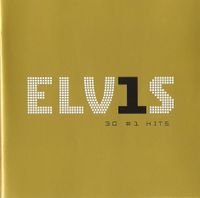
Elvis 30 #1 Hits, 2003.
Interest in Presley's recordings returned during the buildup to the 2002 World Cup, when Nike used a Junkie XL remixed version of his "A Little Less
Conversation" (credited as "Elvis Vs JXL") as the background music to a series of TV commercials featuring international soccer stars. The remix hit
number one in over 20 countries, including the United Kingdom and Australia. At about the same time, a compilation of Presley's US and UK Number 1
hits, Elv1s: 30, was being prepared for release. "A Little Less Conversation" (remix version) was quickly added as the album's 31st track just before
release in October 2002.
Nearly 50 years after Presley made his first hit record and 25 years after his death, the compilation reached number one on the charts in the US, the
UK, Australia and many other countries. A re-release from it, "Burning Love" (not a remix), also made the Australian top 40 later in the year.
Presley's renewed fame continued with another remix in 2003 (this time by Paul Oakenfold) of "Rubberneckin'", which made the top three in Australia
and top five in the UK. This was followed by another album called 2nd to None, a collection of his hits, including the "Rubberneckin'" remix,
that just failed to reach number one.
To commemorate the 50th anniversary in mid-2004 of Presley's first professional recording, "That's All Right", it was re-released, and made the charts
around the world, including top three in the UK and top 40 in Australia.
In early 2005 in the United Kingdom, RCA began to re-issue Presley's 18 UK number-one singles as CD-singles in the order they were originally released,
one of them a week. The first of these re-issues, "All Shook Up", was ineligible to chart due to its being sold together with a collector's box which
holds all 18 singles in it (it actually sold enough to be number two). The second, "Jailhouse Rock", was the number one in the first chart of 2005, and
"One Night"/"I Got Stung", the third in the series, replaced it on the January 16 chart (and thus becoming the 1000th UK number one entry).
All of these have reached top five in the official charts. These re-releases have made Elvis the only artist so far to spend at least 1000 weeks in the
British top 40.
CBS recently aired a TV miniseries, Elvis starring Irish actor Jonathan Rhys-Meyers as Presley.
Shortly after taking over the management of all things Elvis from the Elvis Presley Estate (which retained a 15% stake in the new company, while
keeping Graceland and the bulk of the possessions found therein), Robert Sillerman's CKX company produced a DVD and CD featuring Presley (titled
"Elvis by the Presleys"), as well as an accompanying two-hour documentary broadcast on Viacom's CBS Network, which alone generated $5.5 million.
And while some of Presley's fans fretted that outside management might mar the appeal of Graceland, revenue is up at the Memphis shrine, too.
A channel on the Sirius Satellite Radio subscriber service is devoted to the life and music of Elvis, with all broadcasts originating from Graceland
in Memphis, Tennessee.
In a list of the greatest English language singers of the 20th century, as compiled by BBC Radio, Elvis Presley was ranked second. The poll was topped
by Frank Sinatra, with Nat King Cole and Ella Fitzgerald also in the top ten.
In July of 2005, Elvis edged out Oprah Winfrey to be named the Greatest Entertainer in American history in the Greatest American election conducted by
the Discovery Channel and America Online.
In mid October of 2005, Variety named the top 100 entertainment icons of the 20th century, with Presley landing on the top ten, along with The
Beatles, Marilyn Monroe, Lucille Ball, Marlon Brando, Humphrey Bogart, Louis Armstrong, Charlie Chaplin, James Dean and Mickey Mouse.
A week later, Forbes magazine named Elvis Presley, for the fifth straight year, the top-earning dead celebrity, grossing US$45 million for the
Elvis Presley Estate during the period from October of 2004, to October 2005. Forbes pointed out that CKX spent $100 million in cash, and stock,
for an 85% interest in Presley's income stream in February 2005.
Elvis lives?
There is a widespread belief in some quarters that Presley did not die in 1977. Many fans persist in claiming he is still alive, that he went into
hiding for various reasons. This claim is allegedly backed up by thousands of so-called Elvis sightings that have occurred in the years since his
death. Critics of the notion state that a number of Elvis impersonators can easily be mistaken for Elvis and that the urban legend is merely the
result of fans not wanting to accept his death.
Two main reasons are given in support of the belief that Presley faked his death:
- On his grave, his middle name Aron is misspelled. The double 'A' was removed after his twin brother Jesse Garon was stillborn, Elvis' parents
went to great lengths to have it changed on the official birth certificate.
- "Hours after Elvis' death was announced, a man by the name of Jon Burrows (Elvis' traveling alias) purchased a one way ticket with cash to
Buenos Aires."
Trivia
- On his third and final appearance (Jan. 6, 1957) on the Ed Sullivan Show, Sullivan was so impressed by Elvis that he pointed to him and
told the audience "This is a real decent, fine boy. We've never had a pleasanter experience on our show with a big name than we've had with
you.... You're thoroughly all right." Elvis remains the only one on Sullivan's show to have received such a warm and personal accolade. However,
it has also been said that Presley's manager orchestrated the compliment in exchange for permitting Presley to appear, after Sullivan had
earlier publicly stated his refusal to allow Presley on his program.
- When Presley was drafted into the US Army in March, 1958, his monthly pay went from $100,000 to $78.
- Following an unsuccessful 1954 appearance on the Grand Ole Opry, Elvis was allegedly told by one of the program's producers, "You ain't going
nowhere, son. You may as well stick to driving a truck."
- In 1960, following his return from military service, the various employees hired by Elvis Presley to handle security and his concert tours were
dubbed the "Memphis Mafia" by the news media.
- His given middle name at birth was Aron; however, Aaron was placed on his gravestone by his father because Presley preferred that
biblical spelling and had legally changed it. Aaron is the official spelling used by his estate.
- Presley had a twin brother named Jesse who was stillborn.
- Cryolophosaurus was at one point nicknamed 'Elvisaurus' because of its head crest being similar to Elvis' hairstyle.
- The estate of Elvis Presley earns over 40 million dollars every year which is a record for a deceased entertainer.
- Presley made only one television commercial, an ad for Southern Maid Doughnuts that ran in 1954.
- In 1970 Presley asked President Richard Nixon to ban the Beatles from America because of their left-wing political beliefs, which he denounced
as "anti-American".
- He owned a vast collection of firearms and badges.
- His hair was a natural sandy brown but he dyed it jet black after filming "Love Me Tender."
- Presley made famous a version of the peanut butter sandwich with banana (either mashed or whole) that was grilled or fried, and may have
contained bacon and porridge.
- Estimated to have sold over one billion records worldwide and is one of the best selling recording artists in history.
- Has won three Grammy awards, all for his gospel recordings. These were for the 1967 "How Great Thou Art" LP, for the 1972 LP, "He Touched Me"
and, in 1974, for the song "How Great Thou Art" (live).
- Billboard historian Joel Whitburn declared Presley the "#1 act of the Rock era", beating out The Beatles, based upon his dominance of
Billboard's list of top 100 singles artists since 1955.
- Elvis gave a concert and, at its conclusion, a woman came forward with a crown resting on a plush pillow. She lifted the crown to Elvis and
shouted, "You're the King!" "No, honey," he said, "I'm not the King. Christ is the King. I'm just a singer". Also, in September of 1974, during
one of his two sellout shows at the University of Notre Dame, he stopped singing, as well as motioned for the band to quit playing, in order to
tell those holding a huge banner which read ¨You are the King¨, that he was not going to resume singing until it was taken out from view, adding
that "there was only one King, and that was the Lord, Jesus Christ".
- Thousands upon thousands of people, the world over, are named after Presley, many of them becoming quite well known themselves. Elvis Stojko,
a Canadian who was the three-time World Figure Skating Champion, was named after Presley by his mother, who was a big fan. Elvis Crespo, the
King of salsa and merengue, was also named after Presley by his mother, a native of Puerto Rico who was also a big Elvis fan. Elvis Dumervil,
a former University of Louisville All American football player, was also named after Presley by his mother, an African American. Elvis Mitchell,
the former movie critic for the New York Times, was named after Presley by his parents, who were African-Americans. Elvis Perkins, a
musician who is the son of actor Anthony Perkins, was also named after him, as was Elvis Polansky, whose father, movie director Roman Polanski,
was aslo a huge Elvis fan.
- Musician Elvis Costello adopted Presley's first name a few months before his death in 1977.
- In 2005, and for the fifth year straight, Presley was named the richest deceased celebrity in Forbes Magazine.
- He was proud of his role in King Creole because the part was originally offered to his idol James Dean. Although songs were later
slipped into the movie, Presley considered it his best work.
- His favorite rollercoaster was the Zippin Pippin at Libertyland. He would rent out the park to himself just so he could ride it non-stop.
- He was offered the lead role of Tony in the film adaptation of the Broadway musical West Side Story but Col. Parker forced Presley to
turn it down as non-commercial despite Presley's arguments it would legitimize his acting career. The film won ten Academy Awards including
Best Picture.
- The 1960 Broadway musical Bye Bye Birdie is a supposed satire about the effects of the compulsory U.S. military draft on a famous singer
similar to Presley.
- The Broadway musical "All Shook Up" features the songs of Elvis Presley, and is based on the plot of William Shakespeare's Twelfth Night.
- Presley's favorite female singer was Anne Murray and he recorded a version of "Snowbird".
- Presley was a practitioner of karate. He had an eighth degree black belt when he died.
- Presley was also distantly related to both country singer June Carter Cash and former U.S. President Jimmy Carter.
- Presley was a member of Tau Kappa Epsilon.
- On his 70th birthday, Larry King wondered how Presley would look today. To this, Aaron Brown responded:
"Probably like all those Elvis impersonators".
- Presley's height was officially measured in the army twice and was stated at 5'11.5 inches in bare foot and 6'0.5 inches with shoes.
- The 2002 Disney animated feature Lilo and Stitch contains more Presley songs than there are in several movies in which Presley himself starred.
The film's closing sequence also features a montage of photographs, one of which portrays the film's main characters posing before the gates of
Graceland. The film also broke several rules related to Presley in films which included using his photo, shortening his songs for time and
dressing up like him. However, the Graceland estate allowed the producers this degree of freedom.
- Elvis Presley was a big fan of Captain Marvel Jr, and styled his trademark haircut after that of the comic book character. In addition,
Presley's stage outfits (with a half-cape similar to those worn by the Marvels) and his TCB logo (with a Marvel-esque lightning bolt insignia)
also show inspiration from Captain Marvel, Jr.
- His death occurred only three days before that of Groucho Marx. As a result, the comedian's death did not receive as much media attention as
many felt it deserved.
- The Presley surname comes from the Preseli Hills in Pembrokshire, Wales, UK. The hills are the source of the famous bluestones that make Stonehenge.
- Pop singer Michael Jackson was briefly married to Presley's daughter, Lisa Marie Presley, publicized as a wedding between the "King of Pop" and
the "Princess of Rock". They were only wed for about six months.
- Comedian Dennis Miller cited the Jackson-Lisa Marie wedding as conclusive evidence that Elvis was not alive, because were Elvis alive, he would
have "put the kibosh on it".
- Funk/rock group Living Colour recorded a song titled "Elvis Is Dead" for their Time's Up album. The song ridicules those who contend that
Elvis is alive.
- Presley had a pet rabbit called Dean, after his idol James Dean.
- Wink Martindale, who was a close friend of Presley, aired a nationwide tribute in his memory following the news of his death. Martindale was an
up-and-coming radio DJ in Memphis at the time Presley's career began to take off in high gear.
- Richard Dawson also paid tribute to Presley on an episode of Family Feud.
- In December 2004 Wade Jones from Belmont, NC sold 3 tablespoons of water from a cup that Elvis Presley drank out of on eBay. The water fetched
$455. One week later (January 2005), he sold an appearance of the Elvis Cup on eBay for $3,000 and currently tours with the Elvis Cup, which even
has its own song "The Elvis Cup" written and recorded by a Filipino Elvis impersonator, "Renelvis". Jones says he scored the styrofoam cup at a
1977 concert the King played. Hoping for a better souvenir, he ended up getting a cup out of which he saw Presley drink.
- In April 3, 2005, the UK-based "Doctor Who Adventures" magazine published a list of the top ten historical figures people would most like to
travel back in time to meet. As reported by the BBC, Presley ranked 2nd, behind Sir Winston Churchill. Others in the top ten included, in
ranking order, Albert Einstein, Martin Luther King, Mahatma Gandhi, Princess Diana, Nelson Mandela, Isaac Newton and Queen Elizabeth I.
- Presley had a short mention in the S.E Hinton classic, The Outsiders.
- The Chinese tend to nickname him The King of Cats (Traditional: ??, Simplified: ??, Pinyin:Mao Wáng) after the "hillbilly cat" remark in The
Memphis Press Scimitar interview.
Further reading
- Authors of important works on Presley include
- Peter Guralnick - his books are considered the definitive work on Presley yet he did not interview all close with Elvis.
- Alanna Nash - award winning book by the Society of Professional Journalists' 1994 National Member of the Year
- Albert Goldman - reviled by fans for his harsh criticisms of Presley
- Elaine Dundy - author of "Elvis and Gladys," called "Nothing less than the best Elvis book yet" by the Boston Globe and Kirkus
Reviews, "The most fine-grained Elvis bio ever."
- Michael T. Bertrand - "Race, Rock, and Elvis" by Tennessee State University assistant professor of history. University of Illinois
Press. (2000), ISBN 0-252-02586-5. The book examines the emergence of rock 'n' roll in a social and regional context.
- Louis Cantor - "Dewey and Elvis - The Life and Times of a Rock 'n' Roll Deejay" by a professor emeritus of history at Indiana
University who grew up in Memphis, Tennessee and attended high school with Presley. - University of Illinois Press (2005) ISBN 025202981X
- Thomas Fensch - The FBI Files on Elvis Presley (New Century Books, 2001). ISBN 0930751035. This book reproduces actual texts from
numerous FBI reports dating from 1959 to 1981, which represent a "microcosm [of Presley's] behind-the-scenes life."
This article is licensed under the GNU Free Document License
It uses material from the Wikipedia article - Elvis Presley
|
